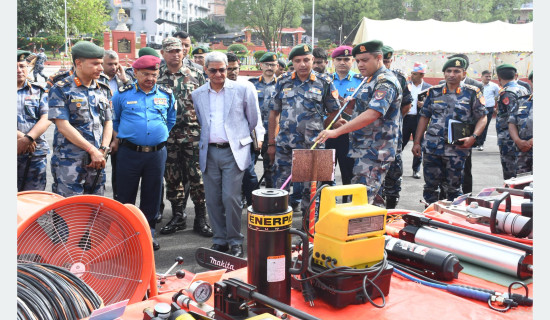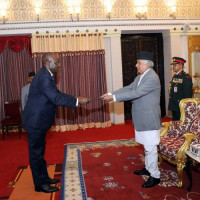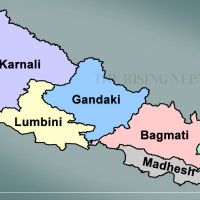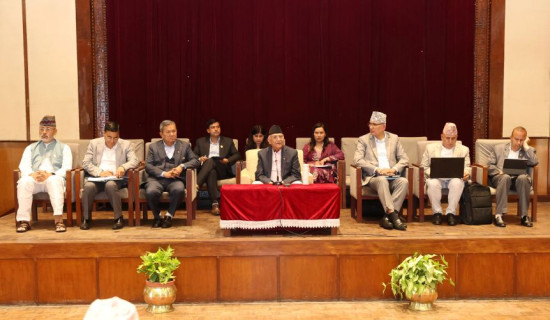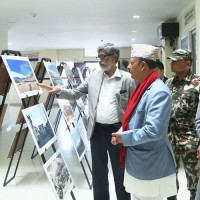- Monday, 2 June 2025
Youths from Majhi, Musahar, Bote communities turn to alternative occupation
By Bomlal Giri,Nawalpur, Jun,1: Young men and women from the marginalised Majhi, Musahar and Bote communities of Nawalpur, who have long depended on rivers and forests, are now increasingly drawn toward alternative occupations.
Traditionally engaged in fishing in the Narayani River, operating boats and collecting wild vegetables and mushrooms from the forest to earn a living, the younger generation of these communities is now exploring new professional paths.
According to Gyan Bahadur Bote, Secretary of the Majhi, Musahar, Bote Welfare Service Committee, 41 youths from these communities have completed a 21-day training programme to become nature guides, choosing to prioritise alternative careers over traditional livelihoods.
All 41 participants from Kawasoti, Devchuli and Madhyabindu municipalities passed the final exam.
The trainees initially took theoretical classes at homestays and spent entire days in the jungle for practical sessions. They learned about safety protocols during safaris, biodiversity, forests, the environment and ecology, all taught in the field to ensure practical understanding for guiding both domestic and foreign tourists, Bote said.
As tourist numbers have increased in areas like Amaltari and Divyapuri, which serve as entry points to Chitwan National Park and popular jungle safari routes, youth's interest in becoming nature guides has also surged, said Prem Shankar Mardaniya, operator of Amaltari Homestay Village and Central Chairperson of the Homestay Federation of Nepal.
With opportunities to earn decent pay and generous tips by guiding tourists, more youths are now choosing this path.
Sujita Bote, a 19-year-old from Baghkhor, Kawasoti-15, who participated in the training after completing her Grade 12 exams, expressed her excitement at being part of the programme for the first time.
“Until now, we did not have access to this kind of training, so we knew nothing beyond our traditional occupations. Now we have had the chance to learn so much, it is inspiring us to engage in forest and biodiversity conservation and promote tourism,” she said.
The government now requires that at least one guide accompany each jungle safari group. This policy has opened up more job opportunities in the field of nature guiding.
Tourists are increasingly visiting the buffer zones of Chitwan National Park and Nawalpur to behold tigers, bears, wild elephants, rhinos, deer, antelopes, blue bulls and other wildlife. The region also attracts visitors for its rich biodiversity, aquatic life in the Narayani River, the crocodile breeding center, Jatayu Restaurant and various wetlands.
Channuram Musahar, 19, recently completed his Grade 12 exams. After completing the exam, he joined the training. He said that the training allowed him to do something meaningful. “Because most youths in the Musahar community have not received formal education, the older generation did not adopt other professions. Traditional occupations cannot even provide for basic survival anymore, so now we must prove ourselves,” he said.
Previously, when a similar training was held in Madi, Chitwan, not a single person from the Majhi, Musahar or Bote communities participated. But this time, interest and participation have increased, said Gyan Bahadur Bote. Currently, only three people from these communities have a nature guide license.
However, DB Chaudhary, a trainer and conservationist who has worked in biodiversity for over three decades, warned that unhealthy competition among tourism entrepreneurs is emerging alongside growing tourist numbers. “If we can eliminate unhealthy competition, the future of this sector looks promising. But such practices are putting the entire nature guide profession at risk,” he said.
According to Chaudhary, one major challenge is retaining guides, as many trained individuals seek better job opportunities abroad due to limited local employment. He noted that about 25 per cent of the trained guides (around 15 individuals) have already migrated for foreign employment in other sectors.
Those who passed this training will now participate in exams conducted by Chitwan National Park. If they pass, they must undergo a nine-day unpaid on-the-job training (OJT). The park opens license applications in Shrawan (July/August), and successful candidates, with recommendations from buffer zone authorities, receive a license valid until the end of Ashar (mid-July), renewable each year for Rs. 2,000.
The training was organised by the Majhi, Musahar, Bote Welfare Service Committee in Nawalpur with joint support from the Gandaki Province Ministry of Tourism and Industry, Chitwan National Park and the Terai Arc Landscape (TAL) project.



